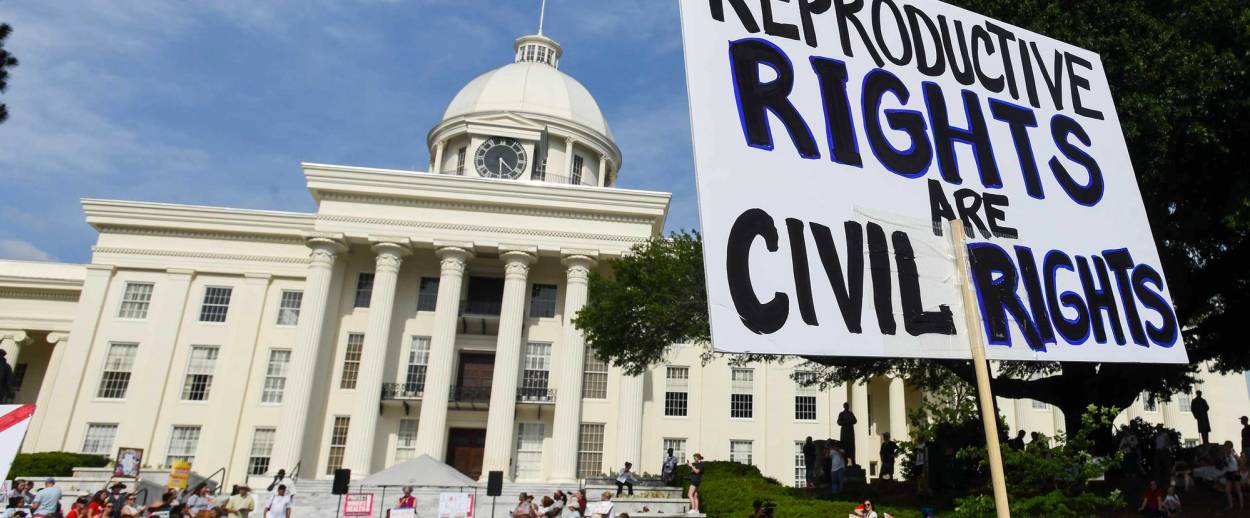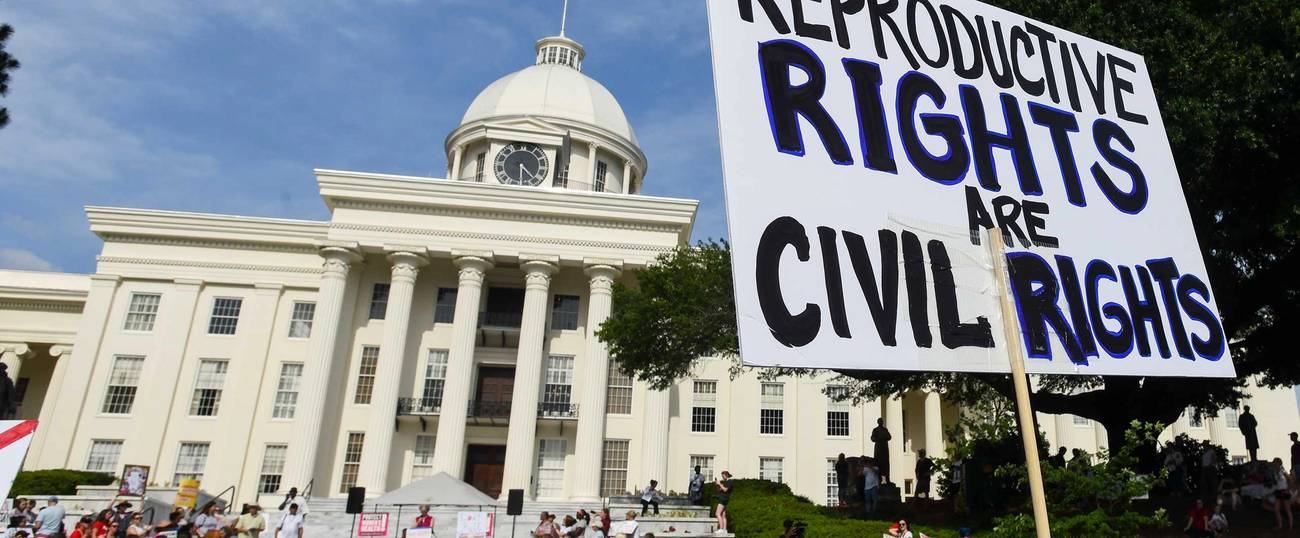Leave the Holocaust Out of Your Abortion Debate
Don’t desecrate the memory of female survivors while taking away women’s right to choose




Before World War II, Dr. Gisella Perl was a successful and renowned gynecologist in her Romanian town. In 1944, after the Nazis invaded, she was sent to Auschwitz. But becoming a prisoner did not mean that Perl ever stopped being a doctor. On the contrary, she was conscripted to work with Josef Mengele, who determined which incoming prisoners would be immediately murdered in the gas chambers upon arrival to Auschwitz, who would be sent to hard, fruitless labor, and who would join his vicious “medical research” and be subjected to his “experiments.” Dr. Mengele tortured his victims, including children and pregnant women, with freezing baths, chemical injections, starvation, and unimaginably violent deaths.
But rather than join Mengele in his butchery, Perl saved the lives of hundreds of pregnant women, defying orders to report them to Mengele. In doing so, she was protecting a uniquely vulnerable population: During the Holocaust, pregnant women were sent to gas chambers upon arrival at concentration camps. Rape and sexual coercion were common in concentration camps and when women became pregnant they were desperate to survive and escape detection. To help them, Perl began secretly performing abortions in extraordinarily difficult conditions, with no anesthesia, no bandages, and no instruments, using her bare hands. Perl had only her words to comfort her patients telling them stories of a beautiful future where they could sing and celebrate holidays together. She defied her orders and risked her life to save hundreds of women’s lives.
All of which makes the use of the Holocaust by pro-life anti-abortion groups particularly grotesque.
American women are facing an assault on our right to choose and on our reproductive health. Several states including Ohio, Georgia, Missouri, and Alabama have passed legislation to ban abortions, jail women and doctors, and even charge women with second-degree murder for miscarriages. These laws are designed to challenge Roe v. Wade, and given the court’s current balance, it is far from assured that Roe will be upheld if challenged again.
While American Jewish women face attacks on our freedom and rising anti-Semitism, abortion opponents are appropriating Jewish history in order to push an agenda that hurts women. The pro-life anti-abortion movement has been appropriating the Holocaust since the 1970s, with leaders such as Right to Life founder and President Dr. J.C. Willke, Surgeon General C. Everett Koop, and Ronald Reagan using Holocaust imagery to promote and justify their views on abortion throughout the 1980s. Koop even once wrote that “legalized abortion was the beginning of a ‘slide to Auschwitz.’” The Christian anti-abortion group Survivors of the Abortion Holocaust centers its mission on pushing this trope and has even protested outside a Holocaust museum demanding that they create an anti-abortion exhibit. This group posits that anyone who was born after 1972 is a survivor of the “abortion holocaust”—belittling the horror that Holocaust survivors experienced and their trauma.
Most terrifyingly, this metaphor is actually being put into legislation—as in the Alabama abortion law, which specifically draws links between abortion and the Holocaust. The bill reads: “It is estimated that 6,000,000 Jewish people were murdered in German concentration camps during World War II; 3,000,000 people were executed by Joseph Stalin’s regime in Soviet gulags; 2,500,000 people were murdered during the Chinese ‘Great Leap Forward’ in 1958; 1,500,000 to 3,000,000 people were murdered by the Khmer Rouge in Cambodia during the 1970s; and approximately 1,000,000 people were murdered during the Rwandan genocide in 1994. All of these are widely acknowledged to have been crimes against humanity. By comparison, more than 50 million babies have been aborted in the United States since the Roe decision in 1973, more than three times the number who were killed in German death camps, Chinese purges, Stalin’s gulags, Cambodian killing fields, and the Rwandan genocide combined.”
In doing this, Alabama has put a moral equivalence between abortion and the Holocaust into state law, revictimizing Holocaust survivors—especially those who had abortions. Eric Johnston, who co-authored the bill, defended the metaphor—stating, unbelievably, that “nobody has a corner on being offended just because their people were killed.”
The pro-life movement’s history of cultural appropriation, comparing abortion to the Holocaust and using Holocaust imagery while ignoring anti-Semitism and the stories, beliefs, and voices of Jewish women is well documented. “Holocaust analogies have a long and sordid history in the anti-abortion movement, often closely linked to harassment of and violence against abortion providers,” said Sarah Lipton-Lubet, who has researched the pro-life movement’s history of cultural appropriation. “Invoking the Holocaust and other human-rights tragedies to strip people of their fundamental right to bodily autonomy is a travesty, all the more so at a time of rising anti-Semitism and white supremacy.”
Jewish women had abortions in order to try to survive the Holocaust. Using the Holocaust to push an anti-abortion agenda that imperils women’s health is immoral and ahistorical and is an affront to the horror these women survived and the medical professionals who saved them. It is also an attack on the rights of their descendants: American Jewish women. 83% of American Jews believe in abortion in all or most cases. Jewish law allows abortion, believing that life starts at birth, and that a mother’s life should never be sacrificed to save a fetus. According to Rashi, a baby only has a soul once the head emerges from the mother. Even in the Orthodox community, where women must seek rabbinic rulings for abortions, they often find themselves facing rabbis who are deeply sympathetic to their requests.
As a result, Alabama’s anti-abortion law is a direct affront to Jewish law, and linking it to the darkest, most painful chapter of Jewish history is inexcusable. This law, which will go into effect in six months, but likely faces a long legal battle, would sentence doctors who perform abortions to life in prison. It has no exemption for rape or incest.
We study history in the hope that we do not repeat its mistakes—and its crimes. We read the testimonies of those, like Perl, who suffered tremendously, even when we can barely stomach reading about these atrocities, in the vain hope that it will deepen our humanity and lessen the possibility such horrors are repeated. When people lie about these women, who they were, and what they experienced, they are stealing their stories–and denying the truth of their experience. There is no morality in that.
***
Like this article? Sign up for our Daily Digest to get Tablet magazine’s new content in your inbox each morning.
Carly Pildis is the Director of Grassroots Organizing for the Jewish Democratic Council of America, and an advocacy professional based in Washington, D.C. Her Twitter feed is @carlypildis, and her website is www.carlypildis.com.